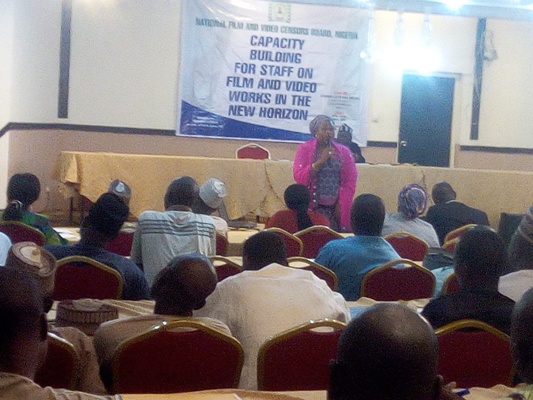A university lecturer, Dr Rasheedah Liman, has called for the establishment of Film Villages in different zones of the country to ensure ease of shooting movies by filmmakers.
Liman, Head of Department of Theatre and Performing Arts, Ahmadu Bello University, Zaria, made the call in an interview with News Agency of Nigeria (NAN) in Kano on Saturday.
She spoke on the sidelines of a capacity building workshop for members of staff of North-West Zone of the National Film and Video Censors Board (NFVCB).
The two–day workshop with theme: “Film and Video Works in the New Horizon,” has in attendance stakeholders from the academia and seasoned industry practitioners as resource persons.
Liman, who is one of the resource persons at the event, said if government established Film Villages, the intensive cost and technical challenges faced by filmmakers would be reduced.
She added that the motion picture industry would then create more jobs and contribute better to Gross Domestic Product (GDP) and national development.
“As the industry is growing there is need for a viable film village that has in it equipment and everything needed, in terms of both human and material resources, for film-making.
“Such a facility will offer necessary cutting edge technology and set you are looking for under one roof at a subsidised rate.
“It will save cost for filmmakers, because moving their cast and crew from one location to another is very expensive, besides the security implications.
“Ideally, such facility should be established in all zones across the country, depending on the kind of film you want to make.
“For example, If a film is on Ibo culture, the one in the South-East will be appropriate, and if a production is focused on Hausa culture, the one in North will be used,” she said.
The lecturer, therefore, urged relevant government agencies and stakeholders at all levels to provide enabling environment for the nation’s motion picture industry to thrive.
She added that film is a veritable tool that could be used to drive national narratives and set agenda for development of societies.
She, therefore, urged government at all levels to support and engage Nigerian filmmakers as partners in nation building.
“It will be easier to get the filmmakers to promote good plans of government for a better society if they are carried along and supported.
“When you listen to people and show to them that you are ready to work with them, they will be willing to contribute their quota to national development.
“In the United States, filmmakers are heavily supported by the government, and most of their films are meant to promote national ideology.
“For example, any American film you watch always project the American heroic disposition and undying philosophy, and that can be done here as well,” she said.
Mr Umar Fage, Acting Zonal Coordinator of NFVCB North- West Zone, in an interview expressed delight that the training would boost the morale of officers of the board in the zone.
“I am very grateful for the array of seasoned resource persons brought together by the management of NFVCB for the capacity building, and I am confident that we are set to be more productive,” he said.
NAN reports that the NFVCB, established in 1993, is a Federal Government agency that regulates the films and video industry in Nigeria.
The Board is empowered by law to classify all films and videos whether imported or produced locally.
It is also the duty of the Board to register all films and videos outlet, including cinemas, across the country and to keep a register of such registered outlets among other functions. (NAN)

